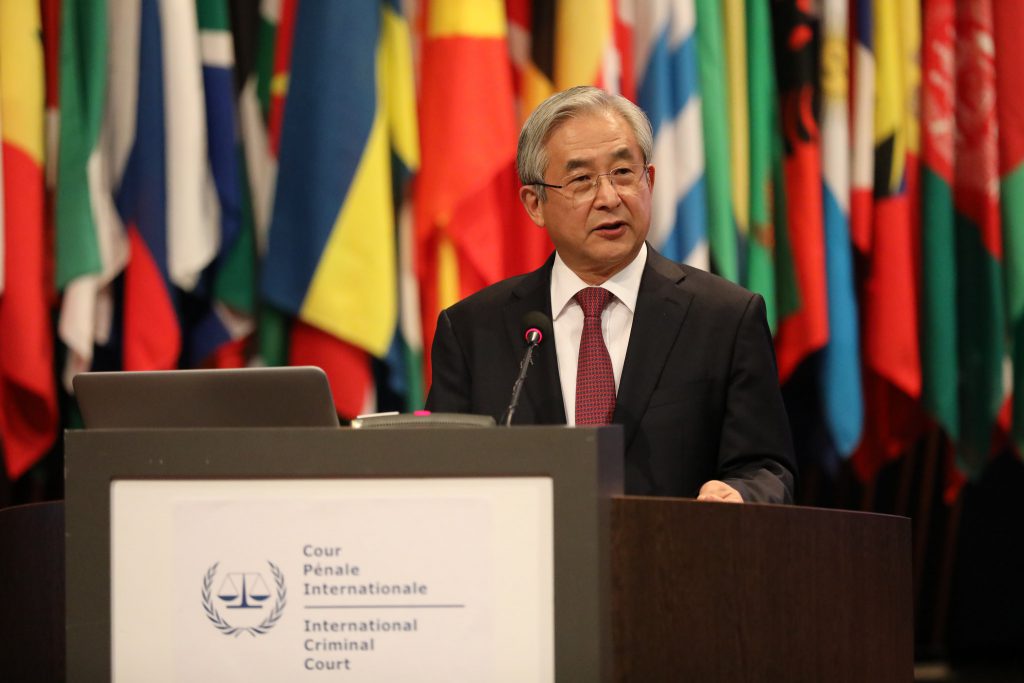By: Madaline George
[Madaline George, JD, is the Whitney R. Harris World Law Institute Fellow at Washington University School of Law. She recently published an article with Opinio Juris on a Side Event at the ICC ASP, which you can read here: Some Reflections on the Proposal for a New Mutual Legal Assistance Treaty for International Crimes.]

(c) ICC-CPI
The Assembly of States Parties (ASP) to the Rome Statute of the International Criminal Court (ICC) held its 17th session from December 5-12, 2018 in The Hague. I had the pleasure to attend on behalf of the Harris Institute. The ICC-ASP was attended by States Parties, observer States, invited States, international and regional organizations and members of civil society. This year’s Assembly celebrated the 20th Anniversary of the Rome Statute.
Appropriately, the Assembly began with a moment of silence in remembrance of Kofi Annan and to commemorate victims of mass atrocities. President of the Assembly, H.E. Mr. O-Gon Kwon then opened the Assembly by emphasizing the Court’s continuing importance and calling on States to not just make aspirational statements and “adopt resolutions and declarations”, but to take “more concrete action.” ICC President, Judge Chile Eboe-Osuji delivered a statement addressing recent criticism of the Court (LINK LS EJIL) and affirmed the positive working relationship between the organs of the Court, while emphasizing the importance of a separation and independence of functions. ICC Prosecutor Fatou Bensouda spoke of her “unshaken resolve” to overcome the “formidable challenges” facing the Court and emphasized the need for the execution of arrest warrants and proper funding of the Court to achieve its goals.

The author with ICC Prosecutor Fatou Bensouda
While there were some disappointing moments – such as the Philippines reaffirming their withdrawal from the Rome Statute, Kenya reiterating its position that Heads of State are immune from prosecution, and Venezuela’s negative intervention regarding its referral to the ICC – the Assembly as a whole reaffirmed the commitment of the world community towards global justice and cooperation. This was evidenced in multiple representatives from Bangladesh pledging their full cooperation to working with the Court in its investigation into alleged crimes by Myanmar and the Netherlands’ pledge to make a voluntary €1 million contribution to the Trust Fund for Victims.
Throughout the Assembly, numerous engaging side events were hosted, organized by civil society and States. Topics ranged from prosecuting gender sexual violence crimes and using universal jurisdiction as a tool for justice for Syria to a transitional justice policy for Mexico and a panel on the legality of the veto in the face of atrocity crimes.
One such side event was on The Initiative for a New Multilateral Treaty on Mutual Legal Assistance and Extradition for Domestic Prosecution of the Most Serious International Crimes, co-hosted by Argentina, Belgium, Mongolia, the Netherlands, Senegal, and Slovenia.
The work of the MLA Initiative has the potential to enhance the capacity of States to cooperate with each other with respect to the investigation and prosecution of crimes currently with the jurisdiction of the ICC, but the work of the Initiative and current Draft Text raise some concerns. In particular, it is not clear what relation an MLA treaty will have to the International Law Commission’s work on articles for a new crimes against humanity treaty.
You can read more about the development and concerns regarding the MLA Initiative in my recent Opinio Juris post, Some Reflections on the Proposal for a New Mutual Legal Assistance Treaty for International Crimes.
